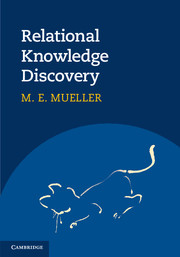6 - Rough set theory
Published online by Cambridge University Press: 05 July 2012
Summary
All of the algorithms we have come across so far make several (severe) assumptions on the domain. Together with the knowledge we feed into our learning systems, the representation itself and the implementation of algorithms may result in heavy biases. But what if we just look at the objects we are given and their relational properties? Why should we try to discriminate indistinguishable objects instead of interpreting indiscernability as “being-of-the-same-breed” – whatever our current knowledge of different existing breeds is?
At the beginning of the last chapter we discovered that features induce equivalence relations and that equivalence relations create blocks of indiscernible objects, that is, “small groups of similar, equal, or equivalent things”. Any two objects in an equivalence class cannot be distinguished from each other, but two objects from different classes can be well discriminated. For our information systems that usually provide a large number of features, we also have many equivalence relations. Furthermore, any intersection of any subset of such equivalence relations also forms a new equivalence relation. And because equivalence relations are relations, and because relations are sets, it appears to be an interesting idea to consider the intersection of equivalence relations as a much finer and more detailed partitioning of our base set.
Information
- Type
- Chapter
- Information
- Relational Knowledge Discovery , pp. 121 - 158Publisher: Cambridge University PressPrint publication year: 2012
